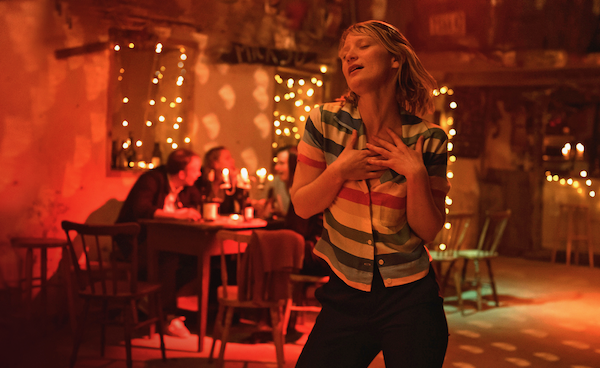Movie review by Greg Carlson
Had a home video copy made its way into his eclectic collection, one cannot help but wonder how Ingmar Bergman might have rated Mia Hansen-Løve’s utterly delightful “Bergman Island.” The French director’s first English-language movie is a bold and satisfying metanarrative that uses the legendary Swedish auteur as the starting point for a dreamy consideration of life, art, romance, loss, regret, and the many challenges of the creative process. Setting the action on Bergman’s hallowed turf turns out to be far more playful and far less austere than one might first guess. Hansen-Løve never takes herself too seriously, lining up a parade of references from “Persona” to “Cries and Whispers” with more disarming humor than ponderous melodrama.
The Fårö setting provides the filmmaker with a treasure chest of opportunities to indulge and explore cinephilia, reflexivity, homage, and intertext, but the potential autobiographical interpretations are equally enticing. The broadest strokes of the director’s previous relationship with Olivier Assayas mirror the fictional marriage between Vicky Krieps’s Chris and Tim Roth’s Tony. Participating in a residency program that lodges the couple in the bedroom where “Scenes from a Marriage” was filmed (just one of Hansen-Løve’s sly jokes), Tony and Chris interact with Bergman admirers and scholars ahead of a retrospective screening of one of Tony’s films.
Hansen-Løve makes clear to the viewer that Chris, a screen performer branching out behind the camera, feels overshadowed by her more celebrated husband. Whether by chance or by choice, the casting of Krieps resonates. Her Hollywood breakthrough as haute couture dressmaker Reynolds Woodcock’s muse Alma Elson in Paul Thomas Anderson’s “Phantom Thread” resides at the heart of another story concerned with artistic practice and the shifting dynamics of women finding power while entangled with professionally accomplished and “difficult” men.
As Chris’s restlessness and her increasing distance from Tony hint at deeper conflict hidden just below the surface of their partnership, Hansen-Løve launches the movie into orbit with “The White Dress,” the story-within-the-story that Chris narrates to a distracted Tony, hoping in vain that he might offer valuable, constructive feedback and make suggestions for an ending. In her screenplay, Chris imagines Mia Wasikowska as protagonist Amy, whose own desire to reconnect with old flame Joseph (Anders Danielsen Lie) while attending a wedding on Fårö triples — and arguably quadruples — Hansen-Løve’s self-portraiture.
The new “Bergman Island,” which shares its title with the 2006 documentary by Marie Nyreröd, isn’t shy in its critiques of the gifted moviemaker. Chris, who refuses to fawn over the man despite demonstrating enough knowledge of his career to keep pace with Tony and the other superfans, wonders aloud whether Bergman sacrificed being a good parent (nine children!) for his art. The frozen-in-time preservation of Bergman’s properties allows his spirit to live on in the pilgrims drawn to Fårö. Several of the famous filmmakers in Jane Magnusson and Hynek Pallas’s “Trespassing Bergman,” another documentary that takes a voyeur’s tour of Bergman’s personal rooms, do their best to account for his fixation on the spiritual and the erotic. Mia Hansen-Løve now joins their ranks.
